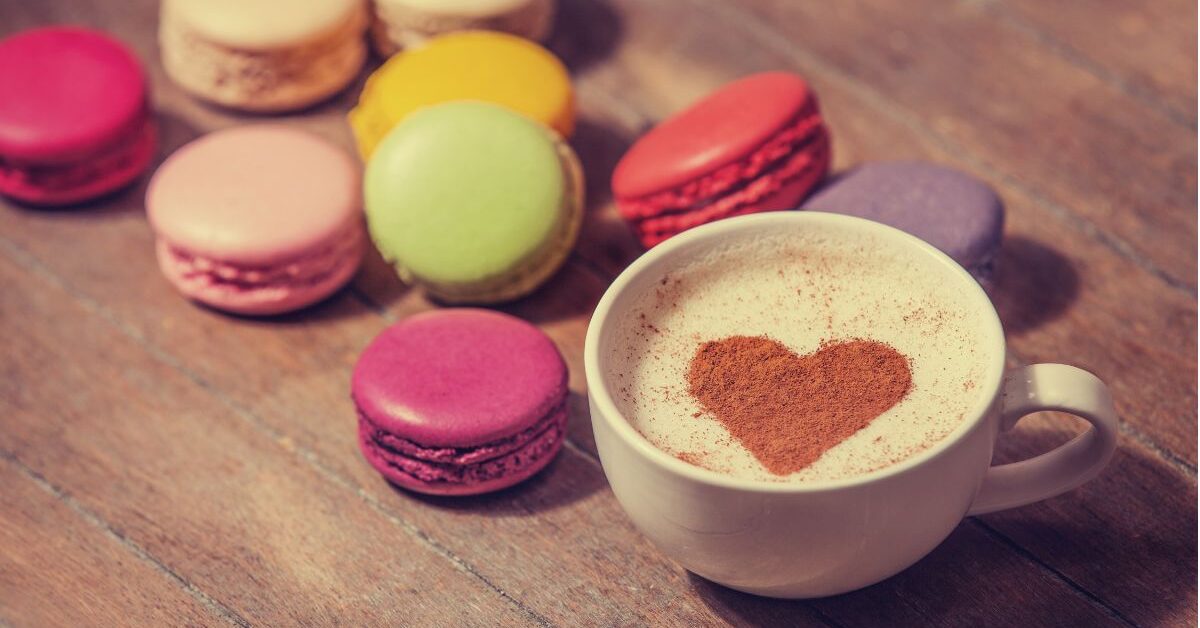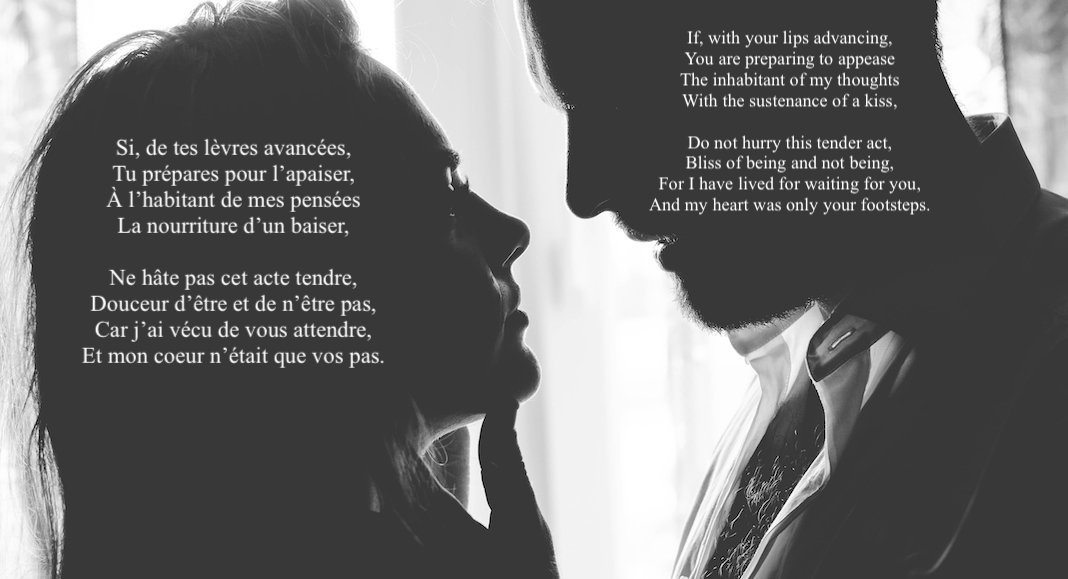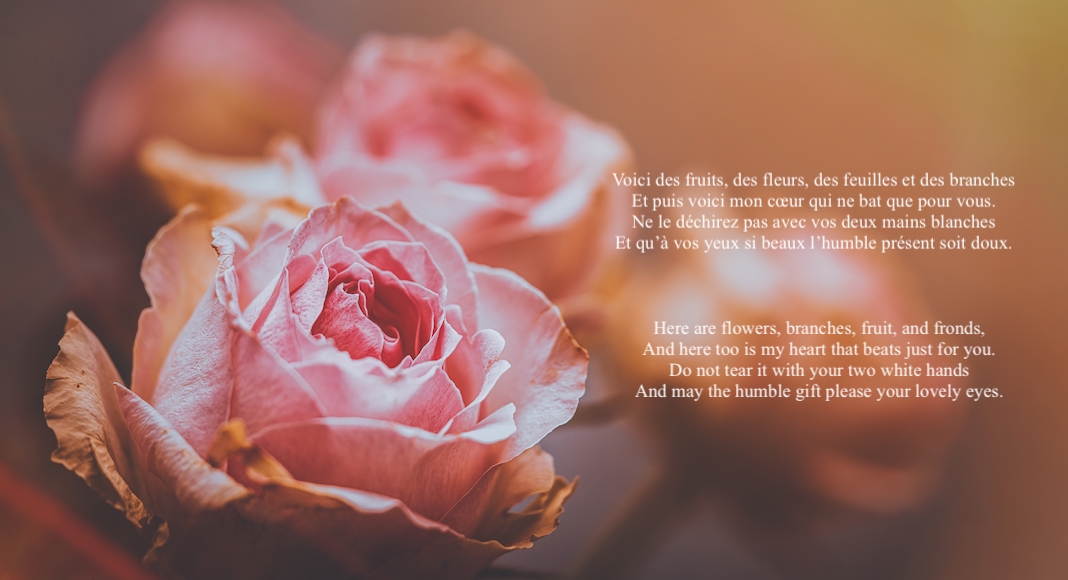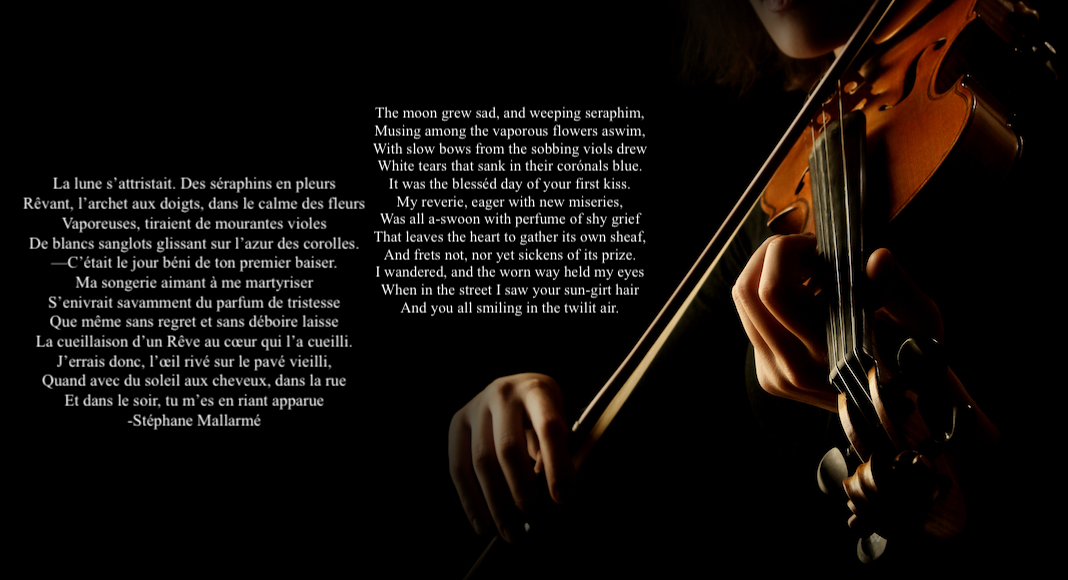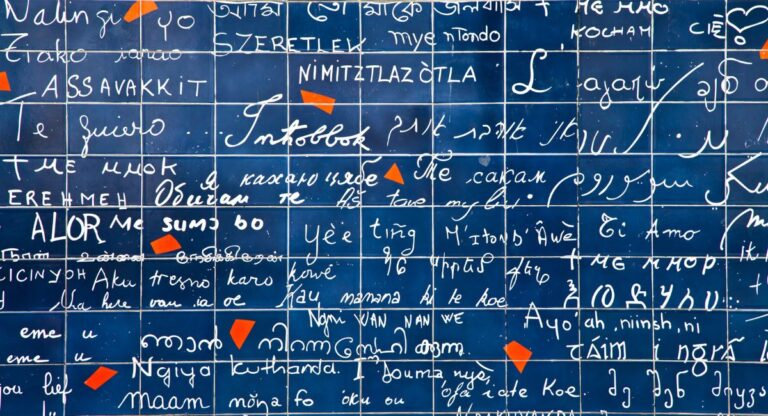Need a French poem to impress your date or S.O.? Love is in the air and here at Frenchly, we’ve got you covered. The French language has long been considered the language of romance, and French poetry is a beautiful way to say “je t’aime” to your love. Here are seven French love poems that will sweep anyone off their feet. We’ve included the original French version of each poem, along with their English translation.
The 7 Famous French Love Poems:
- Roman by Arthur Rimbaud (1870)
- Le pont Mirabeau by Guillaume Apollinaire (1912)
- Les Pas by Paul Valéry (1888 – 1891)
- Nous dormirons ensemble by Louis Aragon (1964)
- À une passante by Charles Baudelaire (1857)
- Green by Paul Verlaine (1872)
- Apparition by Stéphane Mallarmé (1884)
1. Roman by Arthur Rimbaud (1870)
Nuit de juin ! Dix-sept ans ! – On se laisse griser.
La sève est du champagne et vous monte à la tête…
On divague ; on se sent aux lèvres un baiser
Qui palpite là, comme une petite bête….
(June night! Seventeen! – You let yourself get drunk.
The sap is champagne and goes straight to your head…
You are wandering; you feel a kiss on your lips
Which quivers there like something small and alive…)
A nostalgic reverie of young love. Read the full poem here.
2. Le pont Mirabeau by Guillaume Apollinaire (1912)
Sous le pont Mirabeau coule la Seine
Et nos amours
Faut-il qu’il m’en souvienne
La joie venait toujours après la peine
Vienne la nuit sonne l’heure
Les jours s’en vont je demeure
(Under the Pont Mirabeau Seine
Flows with our loves
Must I recall again?
Joy always used to follow after pain
Let the night come: strike the hour
The days go past while I stand here)
The Mirabeau bridge was made famous when Apollinaire published the poem of the same name, after breaking up with the painter Marie Laurencin. Read the full poem here.
3. Les Pas by Paul Valéry (1888 – 1891)
Si, de tes lèvres avancées,
Tu prépares pour l’apaiser,
À l’habitant de mes pensées
La nourriture d’un baiser,
Ne hâte pas cet acte tendre,
Douceur d’être et de n’être pas,
Car j’ai vécu de vous attendre,
Et mon coeur n’était que vos pas.
(If, with your lips advancing,
You are preparing to appease
The inhabitant of my thoughts
With the sustenance of a kiss,
Do not hurry this tender act,
Bliss of being and not being,
For I have lived for waiting for you,
And my heart was only your footsteps.)
Sometimes, good things are worth the wait. Read the full poem here.
4. Nous dormirons ensemble by Louis Aragon (1964)
Que ce soit dimanche ou lundi
Soir ou matin minuit midi
Dans l’enfer ou le paradis
Les amours aux amours ressemblent
C’était hier que je t’ai dit
Nous dormirons ensemble
(Be it Sunday or Monday
Evening or morning, midnight, midday
In hell or paradise
Loves resemble to loves
It was yesterday I told you:
“We will sleep together”)
When you know, you just know. Read the full poem here.
5. À une passante by Charles Baudelaire (1857)
Un éclair… puis la nuit! — Fugitive beauté
Dont le regard m’a fait soudainement renaître,
Ne te verrai-je plus que dans l’éternité?
Ailleurs, bien loin d’ici! trop tard! jamais peut-être!
Car j’ignore où tu fuis, tu ne sais où je vais,
Ô toi que j’eusse aimée, ô toi qui le savais!
(A lightning flash… then night! O fleeting beauty,
By whose glance I was suddenly reborn,
Shall I see you again only in eternity?
Somewhere else, way too far from here! Too late! Perhaps never!
For I do not know where you flee, you don’t know where I go,
O you whom I would have loved, O you who knew it!)
Baudelaire wrote this poem about a missed encounter with a woman he saw on the street. In retrospect, he could have just said hi. Read the full poem here.
6. Green by Paul Verlaine (1872)
7. Apparition by Stéphane Mallarmé (1884)
La lune s’attristait. Des séraphins en pleurs
Rêvant, l’archet aux doigts, dans le calme des fleurs
Vaporeuses, tiraient de mourantes violes
De blancs sanglots glissant sur l’azur des corolles.
—C’était le jour béni de ton premier baiser.
Ma songerie aimant à me martyriser
S’enivrait savamment du parfum de tristesse
Que même sans regret et sans déboire laisse
La cueillaison d’un Rêve au cœur qui l’a cueilli.
J’errais donc, l’œil rivé sur le pavé vieilli,
Quand avec du soleil aux cheveux, dans la rue
Et dans le soir, tu m’es en riant apparue
(The moon grew sad, and weeping seraphim,
Musing among the vaporous flowers aswim,
With slow bows from the sobbing viols drew
White tears that sank in their corónals blue.
It was the blesséd day of your first kiss.
My reverie, eager with new miseries,
Was all a-swoon with perfume of shy grief
That leaves the heart to gather its own sheaf,
And frets not, nor yet sickens of its prize.
I wandered, and the worn way held my eyes
When in the street I saw your sun-girt hair
And you all smiling in the twilit air.)
Mallarmé wrote this poem at only twenty about his future wife, who appears to her as a reincarnation of his late mother. But don’t let the mommy issues get in the way of enjoying this stunner. Read the full poem here.
Who was the most romantic French poet?
Stéphane Mallarmé, Arthur Rimbaud, Guillaume Apollinaire, Paul Verlaine, Louis Aragon, Charles Baudelaire, and Paul Valéry are some of the most romantic French poets in literary history. But these poets all mixed themes of love with obsession, death, and social commentary. They deserve to be known for more than their Hallmark-appropriate stanzas, and it’s worth plumbing the depths of their poetry for their darker conceits. Who knows, it might even make you appreciate their love poems all the more.
Featured image: Stock Photos from Masson/Shutterstock
Also Read:

